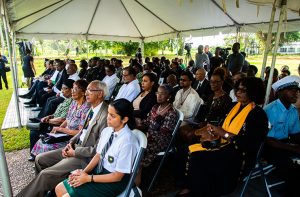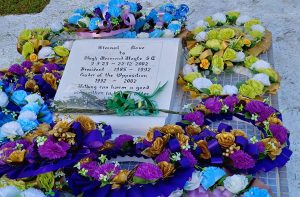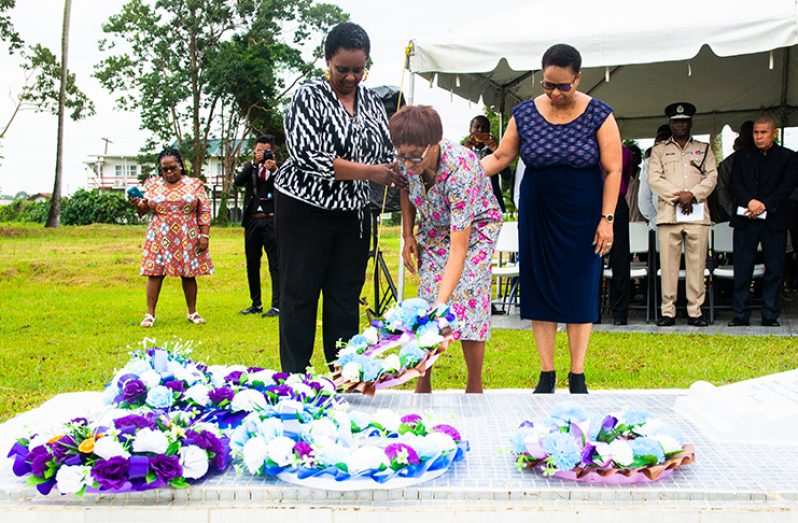FORMER President Hugh Desmond Hoyte led Guyana into its second era of economic transformation and must be remembered for his relentless attitude and actions towards the vision of a developed Guyana, President David Granger said on Sunday.
At the Mausoleum at the Place of Heroes in the Botanical Gardens, a number of Hoyte’s relatives, friends and other prominent individuals attended a commemorative ceremony for the 17th Death Anniversary of the late President.

In his address, President Granger, the Leader of the People’s National Congress (PNC), established that Hoyte battled against hatred and hostility to lead the country into sovereign nationhood as an independent state and as a republic.
He credited the country’s first economic transformation, realised during 1964 to 1985, to Former President, the Late Forbes Burnham, noting that it saw the expansion of public infrastructure, public services such as education, and the establishment of drainage and irrigation projects to support the economy.
The President said that the country’s second economic transformation was also led by Hoyte between 1985 and 1992.
He reminded that the late President was the author of the Economic Recovery Programme, launched in 1989, which contributed to high growth levels during 1989-1992; the motivator behind the economic liberalisation and the visionary behind the environmental protection programme now enjoyed by Guyanese.
President Granger also highlighted Hoyte’s contribution to the empowerment of small states, the protection of the environment, and the Langkawi Declaration which saw the setting aside of over 300,000 hectares of forest for conservation and sustainable development.
“Hugh Desmond Hoyte was a serious man living in serious times. He was a champion of change in the country. His policies laid a firm foundation for sustained economic growth and environmental stewardship. He embraced continuity in our party, strengthening it as a major political force in charting collaborative partnerships. Guyana can learn much from his prudent approach to economic management and to political cooperation,” President Granger said.
The Head of State also underscored the invaluable contribution of the PNC to the Guyanese society, noting that under Hoyte’s leadership collective development was the sole aspiration.
“The People’s National Congress is an essential and inevitable institution in Guyanese nationhood. The PNC, if it did not exist already, would have to be invented; it was the PNC which brought togetherness out of divisiveness, progress out of backwardness and moderation out of extremism,” he said.
As Guyana embarks on its third economic transformation with the beginning of oil production, the Head of State said it is an honour to be the third PNC leader to become President of the country.
“It is my duty to continue the great work of my predecessors: Forbes Burnham and Desmond Hoyte during their presidencies. The country’s third economic transformation is witnessing the inexorable transformation to becoming a petroleum state, to becoming a green state, to becoming a digital state and to becoming an education nation,” President Granger said.
A BROTHER, PRESIDENT

Also present was PNC Chairman and Minister of Public Health, Volda Lawrence, who, while delivering opening remarks, referred to Hoyte as an “extraordinary man, son of this soil, a brother and a President.”
In providing a synopsis of Hoyte’s life, Lawrence noted that he obtained his LLB degree from the University of London in 1959 and returned home in 1960, when he entered practice as a lawyer, becoming a member and chairman of the Legal Practitioners Committee, 1964.
Two years later, in 1966, Hoyte was appointed to the National Elections Commission and served as Chairman of the Customs Tariff Tribunal from 1966-1968. The year earlier, he became Chair of the Timber Grant Wages Council and Vice-President of the Guyana Bar Association.
“I’m quite certain that there are many pleasant memories and many things that can put a smile on our faces,” she said.
A Partnership for National Unity + Alliance For Change (APNU+AFC) Councillor Denroy Tudor added: “His keen mind, academic prowess and his sense of commitment to his country all contributed to his election to parliament in a People’s National Congress government in 1968.”
Hoyte’s other portfolios held were: Home Affairs Minister 1969-1970; Finance Minister 1970 –1972; Works and Communications Minister 1972-1974 and Economic Development Minister, 1974-1980.
In 1990, he was appointed Vice-President with responsibility for Economic Planning and Finance, being re-designated Vice-President of Production in 1983. In August 1984, he became prime minister and first vice-president.
Tudor stated that he held the post with “dignity and a high level of political maturity, projecting his indomitable will as well as his clear insights on national and international issues.”
One year later, Hoyte was appointed as President of Guyana, and served in the post until 1992.
After the remarks, floral tributes were laid at the tomb of the late President by President David Granger; President Hoyte’s sister, Gloria Hoyte; regional representatives, friends of Hoyte and others.
Among those present at the ceremony were Vice-President and Minister of Public Security, Khemraj Ramjattan, who is performing prime ministerial functions; Minister of Legal Affairs and Attorney General, Basil Williams SC; Minister of Social Cohesion with Responsibility for Culture, Youth and Sport, Dr George Norton; Minister of Natural Resources, Raphael Trotman; Minister of Education, Dr Nicolette Henry; Minister responsible for rural affairs in the Ministry of Agriculture, Valerie Patterson-Yearwood; former Prime Minister Hamilton Green; businessman and friend of Hoyte, Stanley Ming; former Minister in the Hugh Desmond Hoyte administration, Vibert Parvattan; Mayor of Georgetown, Pandit Ubraj Narine; and Regional Chairperson of the Regional Democratic Council Region Four, Genevieve Allen.




.jpg)









